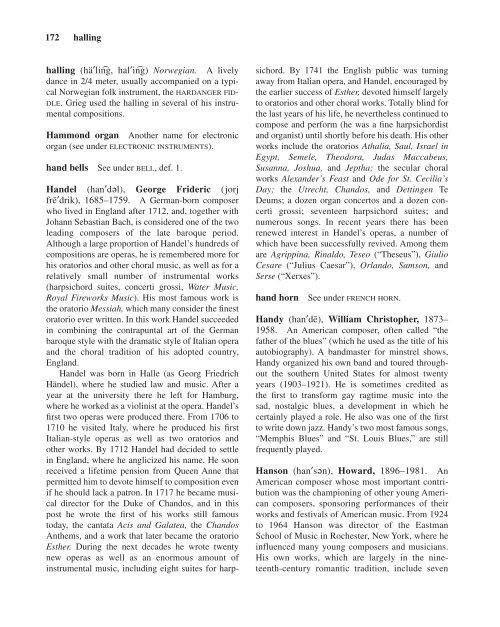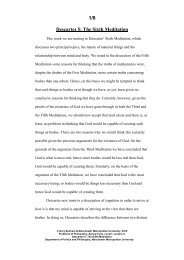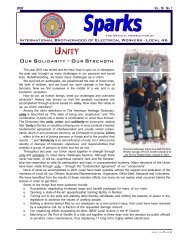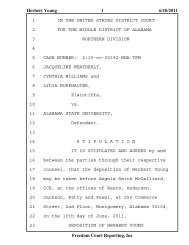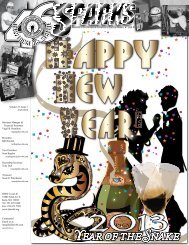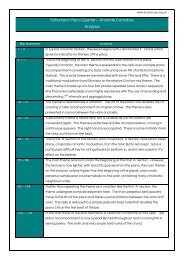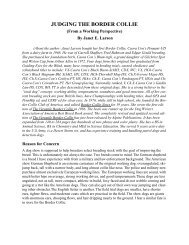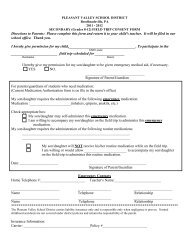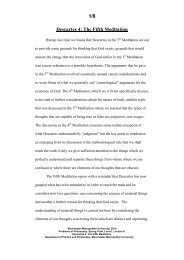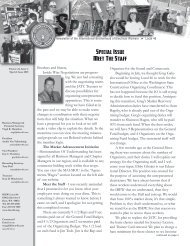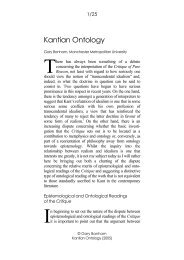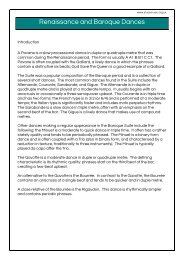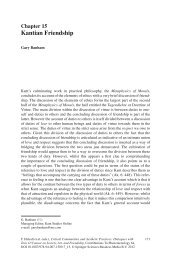- Page 4 and 5:
TheFACTS ON FILEDictionaryof MusicC
- Page 6:
CONTENTSAuthor’s NoteAbbreviation
- Page 10:
ABBREVIATIONSThe following abbrevia
- Page 14:
TheFACTS ON FILEDictionaryof Music
- Page 18 and 19:
acoustic 3ers the pitch one half to
- Page 20 and 21:
African-American music 5with cowbel
- Page 22 and 23:
allemande 7alborada (äl′′ bō
- Page 24 and 25:
ancora 9the alto voice is from the
- Page 26 and 27:
antiphon 11sometimes the SUBDOMINAN
- Page 28 and 29:
ariette 13ACCIACCATURA, which is a
- Page 30 and 31:
art rock 15heard (unamplified, ampl
- Page 32 and 33:
auxiliary tone 17special gatherings
- Page 34 and 35:
BB 1 One of the musical tones (see
- Page 36 and 37:
agpipe 21book, Versuch über die wa
- Page 38 and 39:
allet 23form (with the same music f
- Page 40 and 41:
allet 25SOME FAMOUS BALLETSComposer
- Page 42 and 43:
anjo 27among the civilian populatio
- Page 44 and 45:
aroque 29baritone horn 1 In America
- Page 46 and 47:
Bartók, Béla 31IMPORTANT BAROQUE
- Page 48 and 49:
asse danse 33voice with a strong up
- Page 50 and 51:
attuta 35now used in virtually ever
- Page 52 and 53:
ell 37composers of Western music. B
- Page 54 and 55:
Berlin, Irving 39twelve tones of th
- Page 56 and 57:
Birtwhistle, Harrison 41B-flat A mu
- Page 58 and 59:
lues 43certo, his Concerto Grosso n
- Page 60 and 61:
ore 45of whom are Giuseppe Torelli
- Page 62 and 63:
owing 47effects, and heavy percussi
- Page 64 and 65:
evis 49brass instruments make up th
- Page 66 and 67:
Bull, John 51Bruch (broo KH), Max (
- Page 68:
Byzantine chant 53Buxtehude (books
- Page 71 and 72:
56 Cabezón, Antonio detheatrical r
- Page 73 and 74:
58 caesuraFor older music the missi
- Page 75 and 76:
60 campanacampana (käm pä′nä).
- Page 77 and 78:
62 canticleother baroque forms, rea
- Page 79 and 80:
64 caposix voices, with or without
- Page 81 and 82:
66 castanetscastanets (kas′′tə
- Page 83 and 84:
68 celloWORKS FOR CELLO FROM 1800 O
- Page 85 and 86:
70 chamber operaMendelssohn, and Br
- Page 87 and 88:
72 chiaramenteA direc-chiaramente (
- Page 89 and 90:
74 chorale motetchorale motet A pol
- Page 91 and 92:
76 chordophonechordophone (kôr′d
- Page 93 and 94:
78 cinellicinelli (chē nel′lē).
- Page 95 and 96:
80 clarinettefig. 67 p/u from p. 84
- Page 97 and 98:
82 claviervibrate. The strings’ v
- Page 99 and 100:
84 collagerow neck, either two or t
- Page 101 and 102:
86 concertanteconcertante (kôn′
- Page 103 and 104:
88 concertoIMPORTANT PIANO CONCERTO
- Page 105 and 106:
90 concert overtureA concerto gross
- Page 107 and 108:
92 contrabasscontrabass (kon′trə
- Page 109 and 110:
94 cornetta(the accompanying illust
- Page 111 and 112:
96 country rockactivities such as q
- Page 113 and 114:
98 Credoacclaim, and she has come t
- Page 115 and 116:
100 Cui, Césarflat (see ENHARMONIC
- Page 118 and 119:
DD 1 One of the musical tones (see
- Page 120 and 121:
Delius, Frederick 105Debussy (dΠb
- Page 122 and 123:
differential tone 107D-flat One of
- Page 124 and 125:
dissonance 109dim.Also, dimin. An a
- Page 126 and 127:
doo wop 111dodecupledoh (dō).See D
- Page 128 and 129:
double bass 113fig. 82 p/u from p.
- Page 130 and 131:
Druckman, Jacob 115the most importa
- Page 132 and 133:
dulcimer 117early electronic compos
- Page 134:
Dynamophone 119duramente (doo —
- Page 137 and 138: 122 editingSchubert wrote écossais
- Page 139 and 140: 124 electronic instrumentsas to obt
- Page 141 and 142: 126 electronic musiccreate sounds w
- Page 143 and 144: 128 empresséempressé (äN pre sā
- Page 145 and 146: 130 entr’acteability, or of balan
- Page 147 and 148: 132 étudesome other instruments th
- Page 150 and 151: FF 1 One of the musical tones (see
- Page 152 and 153: fantasia 137written out and the cho
- Page 154 and 155: fifth 139feroce (fe rô′che) Ital
- Page 156 and 157: finger hole 141McBoing-Boing; and M
- Page 158 and 159: Flemish school 143flageolet (flaj
- Page 160 and 161: flute 145sizes, the most common of
- Page 162 and 163: form 147songs by such composers as
- Page 164 and 165: free reed 149considered American fo
- Page 166 and 167: frottola 151F was the favorite inst
- Page 168 and 169: funk 153The fugue is thought to be
- Page 170 and 171: GG 1 One of the musical tones (see
- Page 172 and 173: gehalten 157a fiddle called the RAB
- Page 174 and 175: gioco, con 159Youmans, and Kurt Wei
- Page 176 and 177: Glinka, Mikhail 161complete Borodin
- Page 178 and 179: gong 163Gloria (glô′rē ä). 1 A
- Page 180 and 181: great organ 165The chants for this
- Page 182 and 183: Gubaidulina, Sofia 167medieval trad
- Page 184 and 185: guitare 169guitar A stringed instru
- Page 188 and 189: harmonica 173symphonies, the opera
- Page 190 and 191: harmonium 175beats of music are con
- Page 192 and 193: harpsichord 177notes outside that s
- Page 194 and 195: Haydn, Franz Joseph 179Some of his
- Page 196 and 197: hexachord 181baroque instrumental s
- Page 198 and 199: homophony 183the ballets Nobilissim
- Page 200 and 201: hurdy-gurdy (hûr′dē gûr′dē)
- Page 202: Hz. 187Hypoaeolian (hī′′ pō
- Page 205 and 206: 190 impressionismimpressionism The
- Page 207 and 208: 192 inniglong orchestral works, not
- Page 209 and 210: 194 interpretationLUDE, def. 2. 3 A
- Page 211 and 212: 196 intonationIn other systems of t
- Page 213 and 214: 198 Italian overtureas - = notes)
- Page 215 and 216: 200 Jaques-Dalcroze, ÉmileJaques-D
- Page 217 and 218: 202 jazz bandfingering instruments,
- Page 220 and 221: KK. 1 Also, K.V. An abbreviation fo
- Page 222 and 223: key bugle 207than between two less
- Page 224 and 225: Kodály, Zoltán 209The kithara con
- Page 226 and 227: Ll. Also, L. An abbreviation for ei
- Page 228 and 229: ledger lines 213rina, one of the tw
- Page 230 and 231: lied 215bered chiefly for a single
- Page 232 and 233: Liszt, Franz 217pitch, especially r
- Page 234 and 235: lullaby 219may have been programmed
- Page 236 and 237:
lute 221originally have been made f
- Page 238:
lyric soprano 223Lyres were played
- Page 241 and 242:
226 madrigalstanzas of three lines
- Page 243 and 244:
228 mainmain (maN) pl. mains (maN)
- Page 245 and 246:
230 marching bandnearly always in d
- Page 247 and 248:
232 Massfamous masque, John Milton
- Page 249 and 250:
234 mechanical instruments3 In fift
- Page 251 and 252:
236 medleyNOTABLE MEDIEVAL MUSICIAN
- Page 253 and 254:
238 melody typeis the basis of rhyt
- Page 255 and 256:
240 mestoof tone is apparent in his
- Page 257 and 258:
242 MIDIbelow the treble staff and
- Page 259 and 260:
244 minor intervaland both left the
- Page 261 and 262:
246 modern musicmodern musicFROM 19
- Page 263 and 264:
248 Moravian musiccomposing and tea
- Page 265 and 266:
250 motiftrend was more toward chor
- Page 267 and 268:
252 mplearned the art of quartet wr
- Page 269 and 270:
254 musicologyled the audience in c
- Page 271 and 272:
256 mystical minimalismshaped piece
- Page 273 and 274:
258 naturalcould combine both folkl
- Page 275 and 276:
260 new age musicthe eleventh centu
- Page 277 and 278:
262 notes and restsuntil the mid-tw
- Page 280 and 281:
Oo 1 In scores, a sign placed over
- Page 282 and 283:
ode 267known composers to write pur
- Page 284 and 285:
opera 269op.Also, Op. An abbreviati
- Page 286 and 287:
opera 271SOME IMPORTANT OPERASTitle
- Page 288 and 289:
opera 273SOME IMPORTANT OPERASTitle
- Page 290 and 291:
opera 275SOME IMPORTANT OPERASTitle
- Page 292 and 293:
opera 277SOME IMPORTANT OPERASTitle
- Page 294 and 295:
opéra-comique 279tury, with the ou
- Page 296 and 297:
opus 281SOME FAMOUS OPERETTASTitle
- Page 298 and 299:
orchestra 283SOME NOTABLE ORATORIOS
- Page 300 and 301:
orchestra 285II. Brasses (13 to 18)
- Page 302 and 303:
organ 287Shortly after World War I
- Page 304 and 305:
organ 289this family of pipes, amon
- Page 306 and 307:
organ Mass 291those of the baroque,
- Page 308 and 309:
ôtez 293ornaments, especially in k
- Page 310:
ovvero 295Scarlatti. This form, whi
- Page 313 and 314:
298 palletgreatest composers of chu
- Page 315 and 316:
300 parody MassMozart’s Ein Musik
- Page 317 and 318:
302 passecaillewell as to fill in t
- Page 319 and 320:
304 pastoralkind of pasticcio is as
- Page 321 and 322:
306 pedal organpedal organ The divi
- Page 323 and 324:
308 performance practicewhich usual
- Page 325 and 326:
310 Phrygianpitch, just as a play o
- Page 327 and 328:
312 pianoMUSIC FOR TWO PIANOSCompos
- Page 329 and 330:
314 piano duetpiano duet A piece fo
- Page 331 and 332:
316 pitch bendhave been internation
- Page 333 and 334:
318 polaccaA Polish dance, usu-pola
- Page 335 and 336:
320 portamentoon include BLUES, COU
- Page 337 and 338:
322 pousséremarkable gift for writ
- Page 339 and 340:
324 principal(first oboe, first flu
- Page 341 and 342:
326 proportionproportion In MENSURA
- Page 343 and 344:
328 pulsethat is outstanding. Arias
- Page 345 and 346:
330 quality, tonequality, toneSee T
- Page 347 and 348:
332 quotation, musicalmelody in one
- Page 349 and 350:
334 racket bassoonseventeenth centu
- Page 351 and 352:
336 rappresentativo, stileimprovise
- Page 353 and 354:
338 recitalrecital A public perform
- Page 355 and 356:
340 reelreel A lively dance for two
- Page 357 and 358:
342 related keycreated with a score
- Page 359 and 360:
344 RenaissanceIMPORTANT RENAISSANC
- Page 361 and 362:
346 repeatsecular vocal music was t
- Page 363 and 364:
348 restrest A silence or pause in
- Page 365 and 366:
350 ribibleribibleAnother name for
- Page 367 and 368:
352 rocklove ballads but deal also
- Page 369 and 370:
354 romanticismNarváez, Antonio de
- Page 371 and 372:
356 rounding the next fifteen years
- Page 374 and 375:
SS. 1 In choral music, an abbreviat
- Page 376 and 377:
Satie, Erik 361sansa (sän′sä).
- Page 378 and 379:
saxophone 363ferent sizes of saxhor
- Page 380 and 381:
scherzo 365later works he developed
- Page 382 and 383:
Schubert, Franz 367KLANGFARBENMELOD
- Page 384 and 385:
scoop 369Love and Life”) and Dich
- Page 386 and 387:
secondary dominant 371out separatel
- Page 388 and 389:
serenade 373best-known examples are
- Page 390 and 391:
service 375published in 1923), Erns
- Page 392 and 393:
shake 377teenth century), and James
- Page 394 and 395:
shofar 379board), seven string quar
- Page 396 and 397:
singing school 381sicilianosicilien
- Page 398 and 399:
sixty-fourth note British, hemidemi
- Page 400 and 401:
solmization 385himself, he took a c
- Page 402 and 403:
sonata 387players, the second playe
- Page 404 and 405:
song 389suite (see BINARY FORM). Th
- Page 406 and 407:
sonic environment 391NOTABLE SONG C
- Page 408 and 409:
chords (voice); (4) a solid body is
- Page 410 and 411:
spatial music 395neglected instrume
- Page 412 and 413:
sruti 397spirito, conSee SPIRITOSO.
- Page 414 and 415:
stem 399not the pitches but the ins
- Page 416 and 417:
stopping 401Stockhausen (shtok′ho
- Page 418 and 419:
stretta 403“Four Last Songs,” w
- Page 420 and 421:
string quartet 405string orchestra
- Page 422 and 423:
subject Also, theme. A melody, usua
- Page 424 and 425:
superius 409Couperin and Rameau. Th
- Page 426 and 427:
symphonic poem 411tures of both. A
- Page 428 and 429:
symphony 413invented the name (sinf
- Page 430 and 431:
symphony 415NOTABLE SYMPHONIES (176
- Page 432 and 433:
synthesizer 417first beat for the l
- Page 434 and 435:
TT 1 In choral music, an abbreviati
- Page 436 and 437:
tanbur 421talon, au (ō tA lôN′)
- Page 438 and 439:
Te Deum 423fingerboard (of violins,
- Page 440 and 441:
tenor clef 425most of the “errors
- Page 442 and 443:
theme and variations 427G A B C. Th
- Page 444 and 445:
Thomson, Virgil 429frets were too f
- Page 446 and 447:
timpani 431time signature A sign co
- Page 448 and 449:
tonality 433sections, used a few at
- Page 450 and 451:
transpose 435tonic accentSee under
- Page 452 and 453:
triangle 437son, for example, the f
- Page 454 and 455:
tritone 439and the bottom part is a
- Page 456 and 457:
troubadour 441In addition, at vario
- Page 458 and 459:
tuba 443all have piston valves but
- Page 460 and 461:
twentieth-century music—from 1900
- Page 462 and 463:
tyrolienne 447OTHER COMPOSERS FROM
- Page 464 and 465:
tyrolienne 449OTHER COMPOSERS FROM
- Page 466 and 467:
tyrolienne 451OTHER COMPOSERS FROM
- Page 468 and 469:
UÜbung (Y′boo nk) German. 1 An
- Page 470 and 471:
VV. 1 An abbreviation for VIOLIN. 2
- Page 472 and 473:
Verdi, Giuseppe 457his interest in
- Page 474 and 475:
Victoria, Tomás Luis de 459which a
- Page 476 and 477:
vina 461vihuela de arco (vē wā′
- Page 478 and 479:
viola d’amore 463great virtuoso,
- Page 480 and 481:
violin 465the tailpiece (the ordina
- Page 482 and 483:
Vitry, Philippe de 467important sch
- Page 484 and 485:
volume 469voice 1 Another term for
- Page 486 and 487:
WWagner (väg′nər), Richard (riK
- Page 488 and 489:
Weber, Carl Maria von 473appeal lie
- Page 490 and 491:
wind instruments 475eighth, etc.—
- Page 492 and 493:
Wuorinen, Charles 477bassoon are pl
- Page 494 and 495:
XYZXenakis (ze nak′əs), Iannis (
- Page 496 and 497:
Zwilich, Ellen Taaffe 481twenty-one
- Page 498 and 499:
INDEX OF COMPOSERSThis index direct
- Page 500 and 501:
Index of Composers 485Elgar, Edward
- Page 502 and 503:
Index of Composers 487Moore, Dougla
- Page 504:
Index of Composers 489Weill, Kurt 4
- Page 507 and 508:
492 The Facts On File Dictionary of
- Page 509 and 510:
494 The Facts On File Dictionary of


